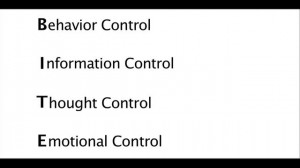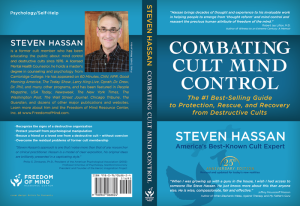Steven Hassan Interview
Steven Hassan and Brian Karcher discuss various topics from Steven’s book “Combating Cult Mind Control” and Brian’s book “Identity Snatchers”.
freedomofmind.com//Media/CCMC25.php
Steven A. Hassan, M.Ed., LMHC, NCC is a former cult member who has been educating the public about mind control and destructive cults since 1976. As a Nationally Certified Counselor (NCC) and Licensed Mental Health Counselor (LMHC), Hassan is the author three books that have received extensive praise from former cult members, families of former members, clergy, cult experts, and psychologists. Combating Cult Mind Control: The #1 Best Selling Guide to Protection, Rescue, and Recovery from Destructive Cults(1988, 1990, 2015), Releasing the Bonds: Empowering People to Think for Themselves(2000), and Freedom of Mind: Helping Loved Ones Leave Controlling People, Cults & Beliefs, (2012, 2013). He also co-developed “Ending the Game”, a non-coercive curriculum designed to educate and empower commercial sex trafficking victims.
He has appeared on 60 Minutes, CNN, NPR, Good Morning America, The Today Show, Larry King Live, Oprah, Dr. Drew, Dr. Phil, and many other programs, and has been featured in People Magazine, USA Today, Newsweek, The New York Times, The Washington Post, The Wall Street Journal, Chicago Tribune, The Guardian, and dozens of other major publications and websites. Learn more about him and the Freedom of Mind Resource Center, Inc. at FreedomOfMind.com
The Conundrum of Approval
“If you just set out to be liked, you will be prepared to compromise on anything at anytime, and would achieve nothing.”- Margaret Thatcher.
In Chapel at Moody, we had a quest speaker, David Choi, from the church of the Beloved. One point in his sermon stuck out to me. He said, “We’re all trying to find security… We’re trying desperately to find validation in our identities.” He shared all the masks that he had worn throughout his life. Growing up as a Korean, he struggled academically to please his father. He always got A’s, but it was never good enough. Then he moved to a boarding school in the Midwest where everyone was smarter than him, so he tried to be the athletic and funny class clown. Then he went to Wheaton where everyone was a spiritual leader and president of their respective Bible Clubs, so he led a youth group. Then he went to seminary in Boston where he again wanted to fit in and show off. It was a never ending game of charades. Continue reading →
Are you in a Christian ministry?
 Before we publish MJ’s excellent new article, I want to share a few mid-week thoughts. Ben’s recent comment about being HOT (honest, open and transparent) prompted me to come up with a top 10 list, Letterman style, to find out if your ubf chapter is a Christian ministry or not. Can you be HOT at your ubf chapter? These 10 statements are normal and healthy. Even a really messed up Christian church would have little concern over these statements. What does your ubf shepherd say about these things? Can you share some of these things every Friday in your testimony (or reflection, sogam, whatever they call it now)?
Before we publish MJ’s excellent new article, I want to share a few mid-week thoughts. Ben’s recent comment about being HOT (honest, open and transparent) prompted me to come up with a top 10 list, Letterman style, to find out if your ubf chapter is a Christian ministry or not. Can you be HOT at your ubf chapter? These 10 statements are normal and healthy. Even a really messed up Christian church would have little concern over these statements. What does your ubf shepherd say about these things? Can you share some of these things every Friday in your testimony (or reflection, sogam, whatever they call it now)?
The theology of “Gross!”: What modern psychology can teach us about purity, disgust, love, and the gospel
 Back in January, I posted a sermon I delivered on Ephesians chapter 2. I wrote:
Back in January, I posted a sermon I delivered on Ephesians chapter 2. I wrote:
In these verses, Paul makes the surprising claim that the law – God’s law, which was given to Israel through Moses on Mount Sinai – created hostility between Jews and Gentiles and erected a wall, an insurmountable barrier, which had kept them apart. This is true. Because of their law, Jews were compelled to separate themselves from non-Jews. They had to avoid all physical contact. Jews could never have fellowship or eat with Gentiles, because Gentiles’ food and utensils and homes and bodies were defiled. For Jews, the mere thought of eating with Gentiles would have made them feel physically ill.
Neuropsychology has shown that most of the judgments that people make in regard to morality – deciding what behaviors are right or wrong – are not based on careful, rational thought. Rather, these decisions come from the gustatory cortex, the part of the brain that helps us to detect bad smells and warns us not to eat certain foods because they are unwholesome or contaminated. I learned about these findings through a fascinating book titled The Righteous Mind by Jonathan Haidt.
Shepherd Brian is Dead
 Now that I’ve got your attention… I’d like to share the last puzzle piece of my recovery from my twenty-four years in University Bible Fellowship. This is the holy grail of my recovery, the last piece that makes the entire picture clear, the piece of the puzzle that explains so many unanswered questions.
Now that I’ve got your attention… I’d like to share the last puzzle piece of my recovery from my twenty-four years in University Bible Fellowship. This is the holy grail of my recovery, the last piece that makes the entire picture clear, the piece of the puzzle that explains so many unanswered questions.
Critique My Ephesians Sermon
HE HIMSELF IS OUR PEACE
Based on Ephesians 2:11-22
Paul’s letter to the Ephesians makes me feel like an ant. Here I am, walking around on the earth, dealing with the countless pressures of my everyday life. Projects at work that are running late. Debts that need to be paid. Things around the house that need to be fixed. Paying attention to how my wife and children are doing. Worries about our aging parents. Worries about this church, managing the building and wanting this congregation to prosper. I’m like an ant in rainstorm, getting pelted with huge raindrops. My little ant-world is flooding; I’m up to my neck in water, and I’m about to get swept away. When I try to pray, the only words that come to mind are:
God, what am I supposed to do?
The B.I.T.E. Model
 These days I love psychology— the science of mind and behavior, the mental or behavioral characteristics of an individual or group, and the study of mind and behavior in relation to a particular field of knowledge or activity. The single most helpful resource for me the past several years has been something called the BITE model. This model of control was developed by Steven Hassan, the author of Freedom of Mind.
These days I love psychology— the science of mind and behavior, the mental or behavioral characteristics of an individual or group, and the study of mind and behavior in relation to a particular field of knowledge or activity. The single most helpful resource for me the past several years has been something called the BITE model. This model of control was developed by Steven Hassan, the author of Freedom of Mind.
How can smart people be controlled?
 Ben’s article about being mentally strong reminded me of Dr. Singer’s work. Margaret Singer is the author of Cults in Our Midst. One of her contributions to society is a list of six conditions that create an atmosphere where people’s minds can be influenced to not only give up their personal freedom and choices, but also be persuaded to promote controlling ideologies. This is an important question to consider, and one I’ve asked many times: How could good, smart, capable young adults become entangled with controlling ideology? Why would an intelligent person give up so much control of their life decisions to another person or group? How could so much control be gained over people’s lives without physical force? How could bright young adults be convinced they were making their own decisions while being manipulated into a systematic ideology? Dr. Singer provides a framework to begin finding answers.
Ben’s article about being mentally strong reminded me of Dr. Singer’s work. Margaret Singer is the author of Cults in Our Midst. One of her contributions to society is a list of six conditions that create an atmosphere where people’s minds can be influenced to not only give up their personal freedom and choices, but also be persuaded to promote controlling ideologies. This is an important question to consider, and one I’ve asked many times: How could good, smart, capable young adults become entangled with controlling ideology? Why would an intelligent person give up so much control of their life decisions to another person or group? How could so much control be gained over people’s lives without physical force? How could bright young adults be convinced they were making their own decisions while being manipulated into a systematic ideology? Dr. Singer provides a framework to begin finding answers.
Do We Need a Counselor?
 After leaving UBF ministry in 2011, one of the first things I noticed was that numerous former members (and some current members too) were going to see psychologists, psychiatrists or biblical counselors. One of the first things a pastor asked me in 2012 after sharing part of my story with him, was “Do you need counseling?” I had to admit, yes I do.
After leaving UBF ministry in 2011, one of the first things I noticed was that numerous former members (and some current members too) were going to see psychologists, psychiatrists or biblical counselors. One of the first things a pastor asked me in 2012 after sharing part of my story with him, was “Do you need counseling?” I had to admit, yes I do.
Cognitive Dissonance, Jehovah’s Witnesses and Me
 Recently, some interesting discussion began on this website about the concept from social psychology known as cognitive dissonance. The Merriam-Webster online dictionary defines it as “psychological conflict resulting from incongruous beliefs and attitudes held simultaneously.” According to Wikipedia — our authoritative, infallible and inerrant source for knowledge of all things — the term first appeared in 1956 in a book titled When Prophecy Fails. In that book, the authors explored the behavior of the members of a small UFO-obsessed cult, how they coped with the inner conflict that came when their predictions about alien invasions didn’t come true.
Recently, some interesting discussion began on this website about the concept from social psychology known as cognitive dissonance. The Merriam-Webster online dictionary defines it as “psychological conflict resulting from incongruous beliefs and attitudes held simultaneously.” According to Wikipedia — our authoritative, infallible and inerrant source for knowledge of all things — the term first appeared in 1956 in a book titled When Prophecy Fails. In that book, the authors explored the behavior of the members of a small UFO-obsessed cult, how they coped with the inner conflict that came when their predictions about alien invasions didn’t come true.
Our friend Vitaly alerted us to a YouTube video called The Witnesses at Your Door which illustrates cognitive dissonance. Vitaly wrote:
I liked this video after I left ubf. There seems to be very many similarities especially in the leaving process.
Vitaly’s comment, and the interesting discussion that he started with Chris, can be found here.
The video is 37 minutes long, and I think it is well worth watching. So I made a unilateral decision (sorry, Vitaly, hope you don’t mind!) to pull the video out of his comment and place it here in an article of its own, so that it gets more attention.



Last 30 Comments